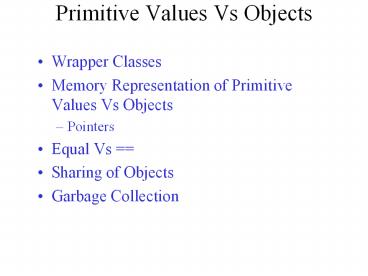Primitive Values Vs Objects - PowerPoint PPT Presentation
1 / 17
Title:
Primitive Values Vs Objects
Description:
Primitive Values Vs Objects Wrapper Classes Memory Representation of Primitive Values Vs Objects Pointers Equal Vs == Sharing of Objects Garbage Collection – PowerPoint PPT presentation
Number of Views:55
Avg rating:3.0/5.0
Title: Primitive Values Vs Objects
1
Primitive Values Vs Objects
- Wrapper Classes
- Memory Representation of Primitive Values Vs
Objects - Pointers
- Equal Vs
- Sharing of Objects
- Garbage Collection
2
Wrapper Classes
Joe Doe.toString()
Object
Vector vector new Vector()
vector.addElement(Joe Doe)
5
new Integer(5)
(new Integer(5)).toString()
AStringHistory
String
vector.addElement(new Integer(5))
vector.elementAt(3)
vector.elementAt(3).intValue()
AStringDatabase
5.toString()
int
boolean
char
double
vector.addElement(5)
3
Other Wrapper Classes
- Double
- public Double(double value)
- public double doubleValue()
- Boolean
- public Boolean(boolean value)
- public boolean booleanValue()
- Character
- public Character(char value)
- public char charValue()
- Float, Short, Long
4
Storing Primitive Values/Variables
int i 5
5.5
double d 5.5
5
double e d
5.5
5
Storing Objects Values/Variables
Integer I new Integer(5)
Double D new Double(5.5)
8
16
6
Structured Objects
public class APoint implements Point int x, y
public APoint (int initX, int initY)
x initX y initY public int getX()
return x public void setX(int newVal) x
newVal public int getY() return y public
void setY(int newVal) y newVal
7
Structured Objects
public class APoint implements Point //
instance vars int x, y //methods
16
Point p new APoint(50, 100)
80
8
Inheritance
public class ABoundedPoint extends APoint
APoint upperLeftCorner, lowerRightCorner
public ABoundedPoint (int initX, int initY,
Point initUpperLeftCorner, Point
initLowerRightCorner) super(initX,
initY) upperLeftCorner
initUpperLeftCorner
lowerRightCorner initLowerRightCorner
9
Inheritance
public class APoint implements Point
int x, y
public class ABoundedPoint extends APoint
Point upperLeftCorner Point
lowerRightCorner
8
16
new ABoundedPoint(75, 75, new APoint(50,50),
new APoint(100,100) )
10
Assignment of Object Variables
Point p1 new APoint(50, 50)
50
APoint_at_8
8
Point p2 p1
50
p1.setX(100)
8
8
11
Assignment of Object Variables
Point p1 new APoint(50, 50)
100
APoint_at_8
8
Point p2 p1
50
p1.setX(100)
p2.getX()
?100
8
16
Point p1
p1 new APoint(200,200)
8
12
Assignment of Object Variables
Point p1 new APoint(50, 50)
100
APoint_at_8
8
Point p2 p1
50
p1.setX(100)
p2.getX()
?100
64
16
Point p1
p1 new APoint(200,200)
p2.getX()
?100
p2 p1
48
8
Point p2
200
APoint_at_64
64
200
13
Assignment of Object Variables
Point p1 new APoint(50, 50)
100
APoint_at_8
8
Point p2 p1
50
p1.setX(100)
p2.getX()
?100
64
16
Point p1
p1 new APoint(200,200)
p2.getX()
?100
p2 p1
48
64
Point p2
p2.getX()
?200
200
APoint_at_64
64
200
14
for Objects
Point p1 new APoint(200, 200)
200
APoint_at_8
8
Point p2 new APoint(200, 200)
200
p2 p2
? false
64
16
Point p1
48
8
Point p2
200
APoint_at_64
64
200
15
for Objects
Point p1 new APoint(200, 200)
200
APoint_at_8
8
Point p2 p1
200
p2 p2
? true
8
16
Point p1
48
8
Point p2
16
Vs Equal for Strings
String s1 Joe Doe
Joe Doe
String_at_8
8
String s2 Joe Doe
s1 s2
? false
64
16
String s1
s1.equals(s2)
? true
48
8
String s2
Joe Doe
String_at_64
64
17
Vs equals() for Objects
Point p1 new APoint(200, 200)
200
APoint_at_8
8
Point p2 new APoint(200, 200)
200
64
16
Point p1
48
8
Point p2
200
APoint_at_64
64
public boolean equals(Point otherPoint)
return x otherPoint.getX() y
otherPoint.getY()
200































